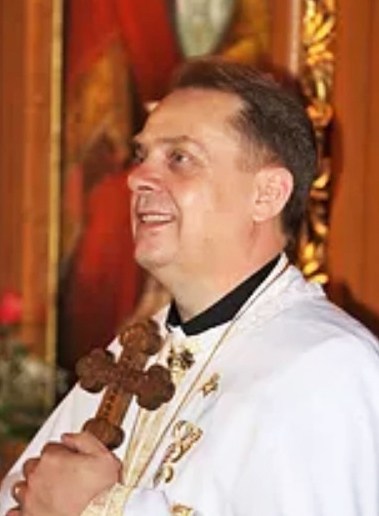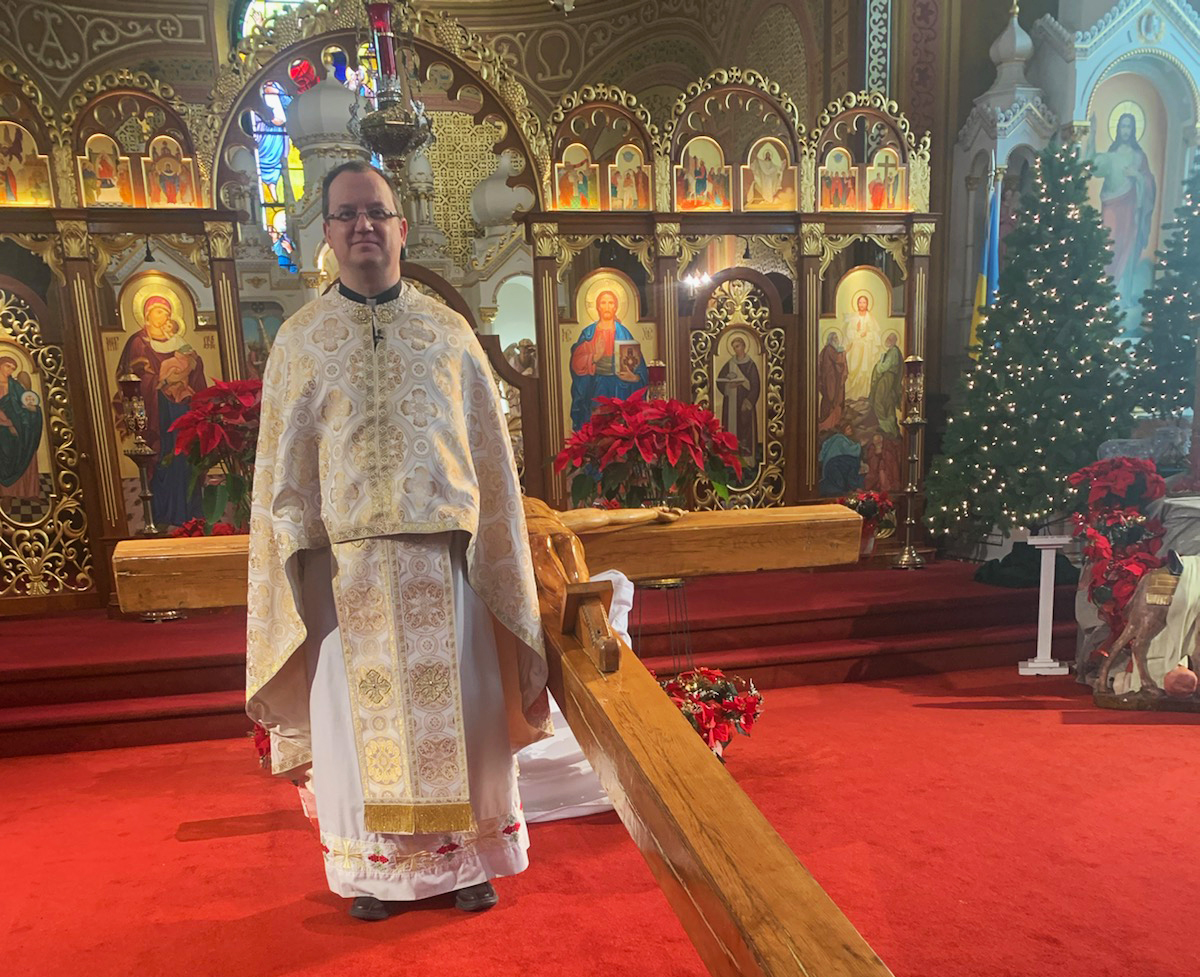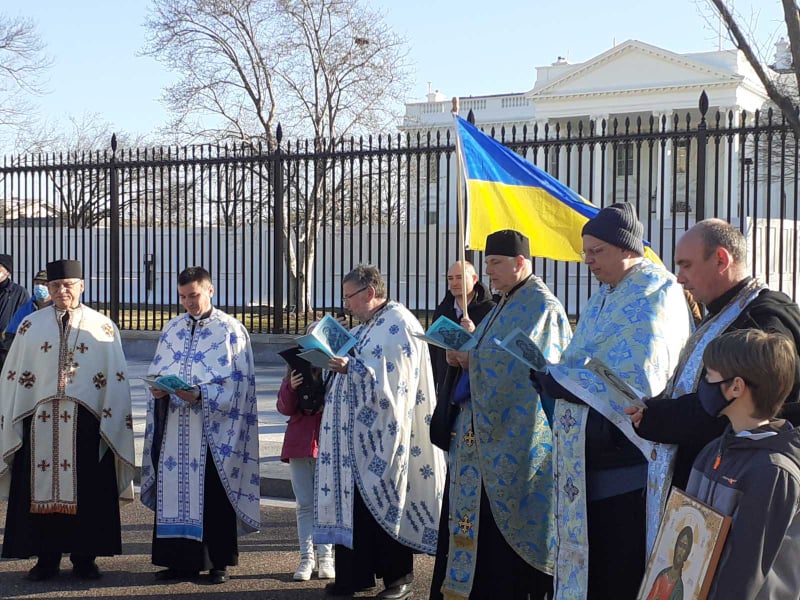With as many as 190,000 Russian troops now amassed at the Ukraine border, Ukrainian Catholics in the Philadelphia area and beyond are redoubling their prayers to deescalate tensions and prevent an invasion.
“The thought of more lives being lost is devastating,” said Father Ihor Royik, pastor of SS. Peter and Paul Ukrainian Catholic Church in Phoenixville. “But God is with us. He does intervene in human history; if he didn’t, it would be a disaster. He’s in charge, even of our neighbor (Russian president Vladimir) Putin.”
(Related: Ukrainian crisis a threat to Europe and democracy, local leaders say)
The Ukrainian Catholic bishops of the U.S. called for a three-day prayer vigil Feb. 13-15 “for peace and the conversion of the hearts of those who preach violence and escalate war.”
[hotblock]
“May our churches be open throughout the day, may the prayer of the church interchange with personal contemplation,” the bishops wrote in a Feb. 12 statement. “Conduct and participate in services, pray the Jesus Prayer, the Marian Rosary, the Paraclesis (a prayer service of supplication), sit with the Scriptures. Fast in order to focus on the hope that only God gives.”
Sisters of the Order of St. Basil from throughout the world gathered online Feb. 12 to pray for peace in Ukraine, with members from that nation, including those at the monastery of St. Paul in Zaporozhye and the monastery of St. Archangel Michael in Kyiv, expressing their gratitude for the support.
Father Royik said he and his parishioners “have been praying during every liturgy … since 2014 for peace in Ukraine, that God will protect our freedoms and our territorial sovereignty.”
Eight years ago, Russia annexed Ukraine’s Crimean Peninsula, while Russian-backed separatists proclaimed “people’s republics” in the eastern regions of Donetsk and Luhansk, together known as the Donbas.

Father Ihor Royik, pastor of SS. Peter and Paul Ukrainian Catholic Church in Phoenixville, said God intervenes in human history and remains in charge amid threats of a Russian invasion of Ukraine. (SS. Peter and Paul Ukrainian Catholic Church
The move came just 23 years after Ukraine gained independence following the collapse of the Soviet Union, of which it had been a part.
Clashes, shelling and sniper attacks have become common in eastern Ukraine as part of what the U.S. Ukrainian Catholic bishops termed a “Kremlin-led war.” The United Nations reported close to 1.5 million registered internally displaced persons in the country as of 2021, and at least 3,353 civilian deaths and more than 7,000 civilian injuries between April 2014 and March 2020. In total, between 14,000 and 15,000 are estimated to have been killed in the conflict to date.
Despite the steep cost, Ukrainians are determined to preserve their way of life, said Father Royik.
“We have a lot to proud of and we have a lot to protect,” he said.
“Really hard memories” of a very different Ukraine – one under Soviet communism – still resonate for Father Mykola Ivanov, pastor of Transfiguration of Our Lord Ukrainian Catholic Church in Shamokin, Pa.
Until his teenage years, Father Ivanov and his family could only listen to the Divine Liturgy on Vatican Radio, since churches were closed.
“We were forbidden to tell anyone we were Catholics,” he said. “My father was a police officer; he would lose his job right away.”
(Watch CatholicPhilly.com’s Feb. 9 interview with Archbishop Borys Gudziak speaking directly from Ukraine.)
Schoolchildren were often questioned by “people in suits” who entered classrooms “asking us little kids about our parents – do they believe in God, do they pray, do you pray, do you go to church,” Father Ivanov recalled. “And if you said your parents believed in God, they would lose their jobs.”
Most Ukrainian families had “relatives who were suppressed by the Soviet Union government,” he said, and even after communism there began to crumble, faithful still celebrated liturgies secretly out of fear, gathering in homes at night or “in a forest, under a wooden cross,” he said.

Father Mykola Ivanov, pastor of Transfiguration of Our Lord Ukrainian Catholic Church in Shamokin, Pa., said he has “really hard memories” of Ukraine from its time as a member of the Soviet Union. (Father Mykola Ivanov)
“Seeing the Russian army coming to the border, you can imagine the feeling in the air,” said Father Ivanov, who also draws a clear distinction between “the Russian people and the Russian government.”
“There are a lot of healthy-thinking people in Russia, though they are suppressed by the government,” he said. “They are in a minority position right now.”
Father Myron Myronyuk, pastor of St. Vladimir Ukrainian Catholic Church in Scranton, Pa., agreed.
“People need to know the true story,” he said. “We have so much disinformation.”
Father Myronyuk, whose twin brother lives in Kyiv, said Ukrainians “are doing two things” at the moment.
“They are all praying, and it doesn’t matter if they are Catholic, Protestant or Orthodox; they’re praying,” he said.
A “Jericho Rosary” for Ukraine’s protection from Russian aggression was launched Jan. 24 through Jan. 30 by Ukrainian Catholic Bishop Leon Dubravsky of the Diocese of Kamianets-Podilsky.
The initiative invokes the sixth chapter of the Book of Joshua, in which the ancient Israelites triumphed over the city of Jericho through a seven-day, divinely led campaign of prayer and praise.
Along with their intercessions, Ukrainians are preparing to fight, said Father Myronyuk.
“We always defend our country,” he said.
At the same time, Ukrainian faithful remain focused on the ultimate source of power.
“I believe God is in control,” said Father Royik. “We say ‘thy will be done,’ and he does the best for his children. There’s no better assurance than knowing our Creator is with us, and that’s why we address him as ‘Our Father’ in prayer.”
***
This article has been updated to show the estimated number of Russian troops on the Ukraine border as of Feb. 18.
PREVIOUS: New commission set to ‘transform local church’ through ‘the power of Christ’
NEXT: Schedule set for synod listening sessions in archdiocese




Share this story